🔊 The Outburst
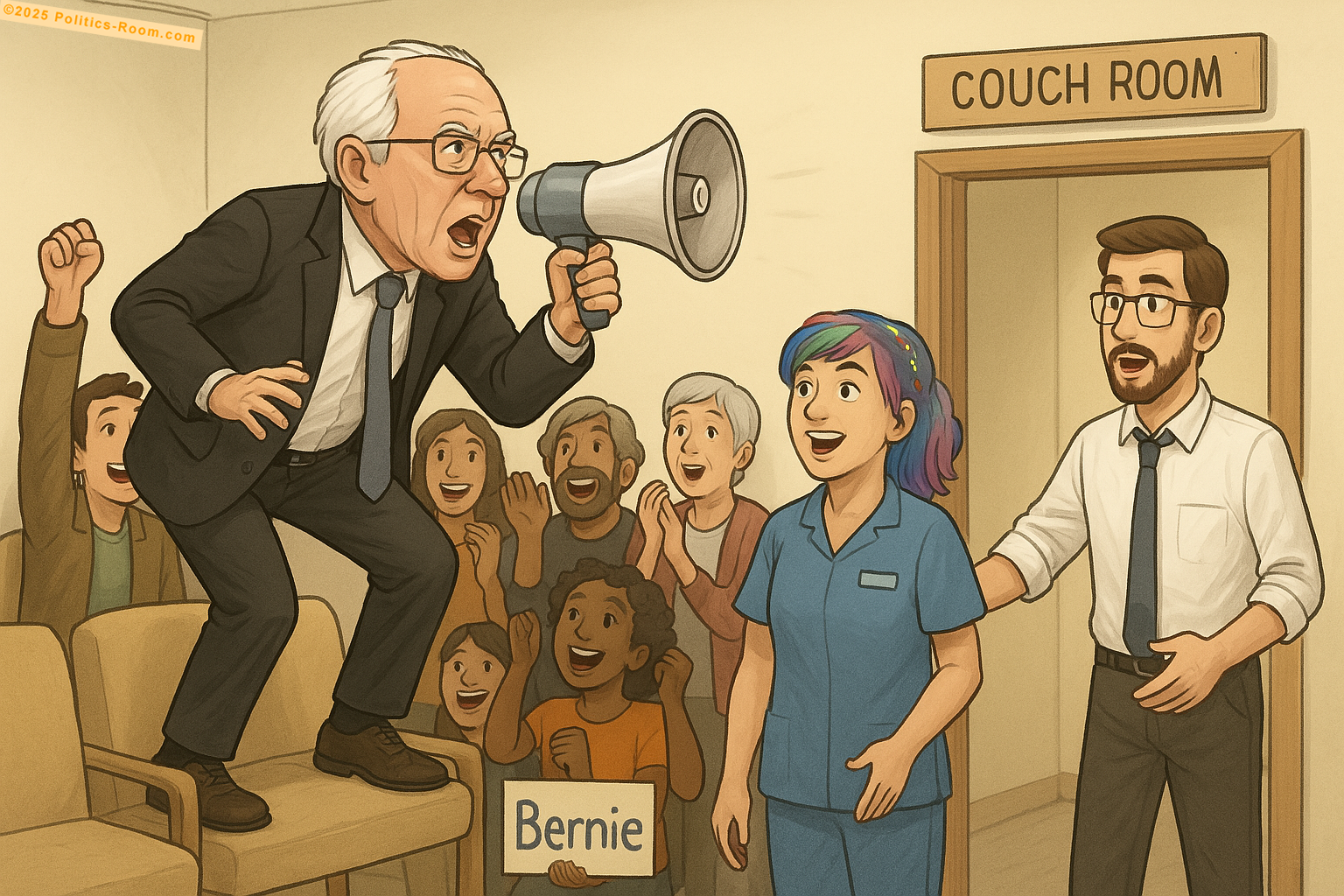
The waiting room had never been so loud. Senator Bernie Sanders stood on a chair, bullhorn in hand, his distinctive Brooklyn accent amplified to fill every corner of the space. The assembled crowd—patients, staff, and even a few people who seemed to have wandered in from the street—responded with enthusiastic cheers to each of his proclamations.
Bernie Sanders: "Those Democrats are driving me crazy! They are lame jackasses! They had the presidency, but what did they do with it? Compromising! Calculating! Capitulating to corporate interests!"
The crowd roared in approval. Someone waved a hand-painted sign reading "FEEL THE BERN." Another held up a phone displaying a donation page for Sanders' latest progressive initiative.
Bernie Sanders: "How many times do I have to tell them? The American people want Medicare for All! They want free public college! They want billionaires to pay their fair share! But what do establishment Democrats do? They talk about 'incremental change' and 'political reality.' I'll tell you what's real—the suffering of working families in this country!"
The receptionist looked alarmed, glancing between the increasingly animated crowd and the "Couch Room" door where the psychologist stood observing the scene. Dr. Bennett adjusted his black-rimmed glasses, loosened his tie slightly, and approached the makeshift rally with calm determination.
Dr. Bennett: "Senator Sanders, perhaps we could continue this conversation in my office? The 'Couch Room,' as my staff calls it."
Sanders either didn't hear him or chose to ignore the suggestion.
Bernie Sanders: "We're building a movement, my friends! Not just for 2024, but beyond! To finally transform this country into one that works for all of us, not just the top one percent!"
Dr. Bennett moved closer, gently gesturing toward his office door.
Dr. Bennett: "Senator Sanders, please. Calm down and tell me all about it. In my office, where we can have a real conversation."
Something in the psychologist's tone—professional but firm—finally broke through. Sanders lowered the bullhorn, looked at the expectant faces around him, and nodded reluctantly.
Bernie Sanders: "This conversation isn't over, folks! The oligarchs would love for us to be silent, but we will not be silenced!"
With that final declaration, he followed Dr. Bennett into the office, the receptionist closing the door behind them with visible relief.
📋 The Agenda
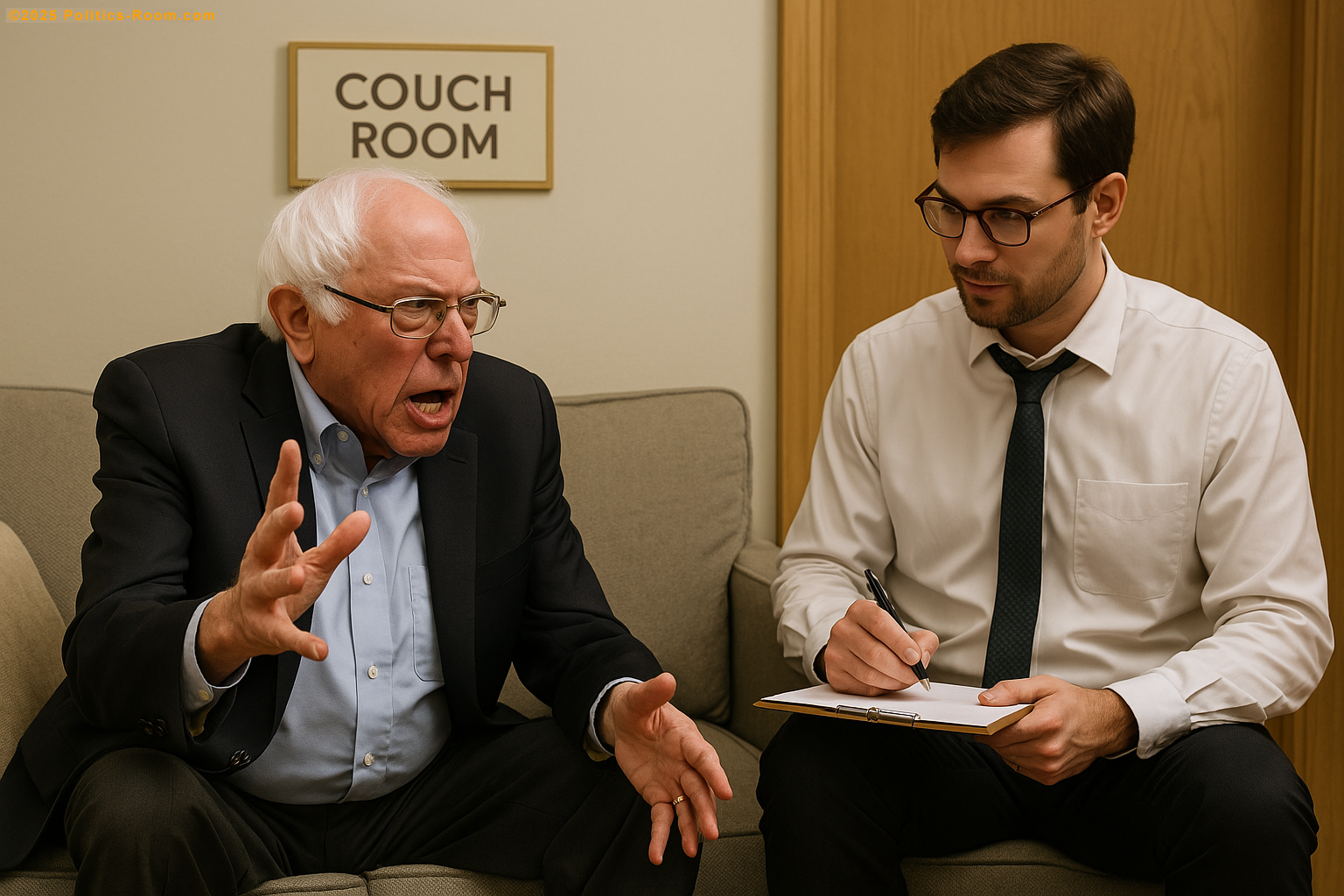
Inside the "Couch Room," Sanders declined to lie down on the traditional psychoanalyst's couch, instead choosing an upright chair where he could maintain his characteristic animated posture. Dr. Bennett sat across from him, notepad ready.
Dr. Bennett: "So, Senator, what brings you here today? That was quite a scene in the waiting room."
Bernie Sanders: "Look, I've spent decades fighting for working families in this country. Decades! And what do I see? A Democratic Party that claims to represent those families while catering to Wall Street and corporate donors."
He leaned forward, his hands emphasizing each point as he laid out his agenda:
Bernie Sanders: "Let me be very clear about what we're fighting for:"
- 🏥 Healthcare as a Right: Medicare for All isn't just a policy—it's a moral imperative. The United States remains the only major country that doesn't guarantee healthcare to all people.
- 🎓 Education Without Debt: Young people shouldn't be punished with decades of debt for getting an education. Public colleges and universities should be tuition-free.
- 💰 Economic Justice: The obscene level of income and wealth inequality in America is fundamentally immoral. The three richest Americans own more wealth than the bottom 50% of our society!
- 🌍 Climate Action: The Green New Deal isn't just environmental policy—it's about creating millions of good-paying jobs while saving our planet.
- 🏛️ Political Revolution: We need to transform our political system to work for ordinary Americans, not just wealthy campaign contributors.
Bernie Sanders: "And here's what the establishment Democrats don't understand—these aren't radical ideas! These are ideas supported by the majority of Americans!"
Dr. Bennett nodded thoughtfully, making notes before responding.
Dr. Bennett: "Senator, your passion is evident, and many of these goals are clearly aimed at helping vulnerable populations. But I'm curious—do you see yourself as part of the Democratic Party or separate from it?"
Sanders tensed slightly at the question.
Bernie Sanders: "I am an Independent who caucuses with the Democrats. I've run for president as a Democrat twice. I campaign for Democratic candidates. But I maintain my independence because I believe in pushing the party to be better than it is."
Dr. Bennett: "That's an interesting position to maintain. You use the party's infrastructure and platform while simultaneously criticizing it from both inside and outside. Do you think this approach has consequences for the party's unity and effectiveness?"
🧩 The Contradictions
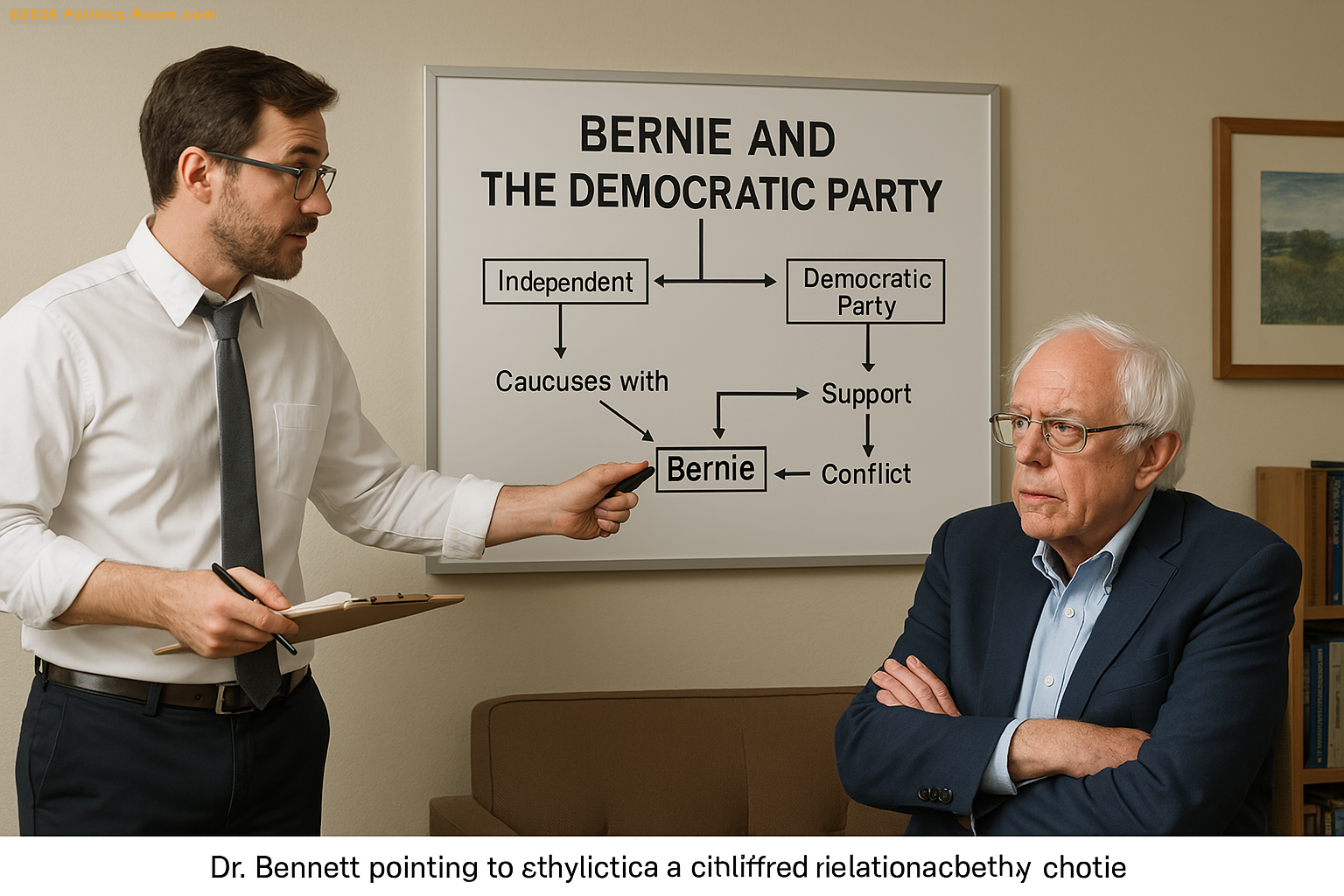
Dr. Bennett rose and moved to a whiteboard on the wall. He began sketching a simple diagram showing overlapping circles labeled "Bernie," "Democratic Party," "Progressives," and "Independent Voters."
Dr. Bennett: "Senator, I'd like to explore what appears to be a fundamental contradiction in your relationship with the Democratic Party. On one hand, you've said—"
Sanders interrupted, his finger pointing emphatically.
Bernie Sanders: "Let me stop you right there. The contradiction isn't in my position. The contradiction is in a party that claims to represent working people while taking millions from corporate donors. The contradiction is in saying healthcare is a right while refusing to fight for Medicare for All."
Dr. Bennett remained calm, adjusting his approach.
Dr. Bennett: "I understand that's your view. But I'm asking you to consider a different perspective. You're currently on what you've called a 'Fighting Oligarchy Tour' with Representative Ocasio-Cortez. You're raising funds, building organizational capacity, and cultivating a movement that exists partially inside and partially outside the Democratic Party."
He circled the overlapping areas on his diagram.
Dr. Bennett: "My question is: Are you helping or hurting the Democratic Party in its ability to defeat Trumpism, which you've identified as an existential threat?"
Sanders sat back, unusually quiet for a moment.
Bernie Sanders: "I'm not trying to help or hurt the Democratic Party. I'm trying to help America. I'm trying to create a government that works for all of us, not just the wealthy and the powerful."
Dr. Bennett: "But you do this while helping yourself to the Democratic Party apparatus. You fundraise through ActBlue. You participate in Democratic primaries. You receive committee assignments through the Democratic leadership in the Senate. Yet your rhetoric often undermines the party's unity."
Sanders leaned forward, his voice passionate but controlled.
Bernie Sanders: "Unity behind what? Behind compromised policies that don't solve the fundamental problems facing our country? I believe in unity, but it has to be unity around bold solutions that actually address the crises we face."
Dr. Bennett: "Let's look at some concrete examples. Your 'Fighting Oligarchy Tour' is explicitly building infrastructure in key congressional districts. Are you directing that infrastructure to support all Democrats, or just those who align with your particular vision?"
Bernie Sanders: "We're supporting candidates and elected officials who stand up for working families, who reject corporate money, who fight for progressive policies. If establishment Democrats want that support, they know what they need to do."
Dr. Bennett made another note, then looked up with a direct gaze.
Dr. Bennett: "So you're setting conditions on party unity based on adherence to your specific policy positions. Has it occurred to you that this approach might weaken the party's overall electoral chances?"
🔮 The Future
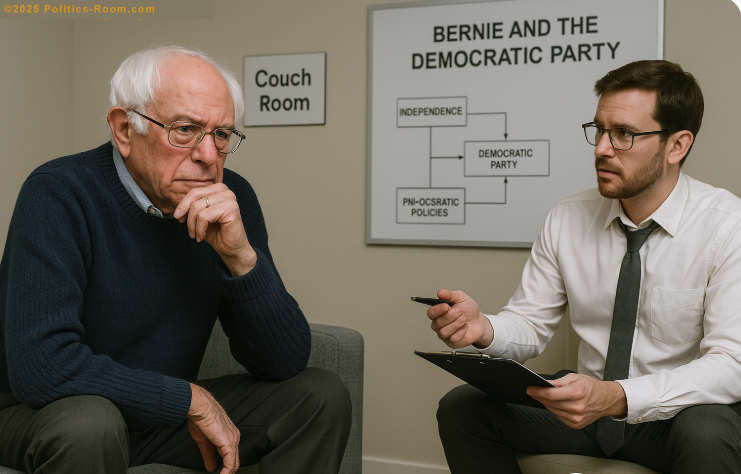
Sanders stood up, pacing the room with the energy of a man half his age.
Bernie Sanders: "What weakens the party is its failure to stand for something! People aren't inspired by moderation and incrementalism. They're inspired by bold visions for the future."
Dr. Bennett remained seated, his voice calm but incisive.
Dr. Bennett: "Senator, you're now 83 years old. You've run for president twice as a Democrat and lost the nomination twice. Yet your rhetoric and your organizational efforts suggest you're positioning yourself—or perhaps your designated successor—for another run. Is that accurate?"
Sanders stopped pacing, his expression a mixture of indignation and thoughtfulness.
Bernie Sanders: "This isn't about me. It's about the movement. It's about the millions of people who believe in our vision for America."
Dr. Bennett: "That's not quite an answer to my question. Let me be more direct: Do you intend to run for president in 2028, or to position someone like Representative Ocasio-Cortez to run with your support?"
Sanders resumed pacing, his hands gesturing emphatically.
Bernie Sanders: "I haven't made any decisions about 2028. That's four years away. Right now, I'm focused on building a movement to take on the billionaire class and transform our economy and our politics."
Dr. Bennett: "Senator, your non-answer is revealing. Your continued ambiguity about your future plans keeps you as a potential threat to Democratic unity. As long as you might run again—either yourself or through a designated progressive champion—you remain a factor that divides rather than unites."
Sanders' famous scowl deepened.
Bernie Sanders: "So what are you suggesting? That I abandon my principles? That I stop fighting for Medicare for All, for free public college, for a Green New Deal?"
Dr. Bennett: "Not at all. I'm suggesting that your admirable policy goals might be better served by clarity about your personal political ambitions. If you were to announce definitively that you will not run for president in 2028, you could still advocate for all those policies while removing a significant source of party division."
Sanders sat back down, his energy momentarily subdued by genuine reflection.
Bernie Sanders: "The movement needs leverage. If the establishment knows I'm not running, they'll feel free to ignore our demands even more than they already do."
Dr. Bennett: "Is that really true? Or would a clear statement about your future plans allow you to focus entirely on policy advocacy without the complications of presidential politics? Wouldn't it actually give your movement more credibility if it wasn't tied to your personal ambitions?"
🐴 The Donkey Ride
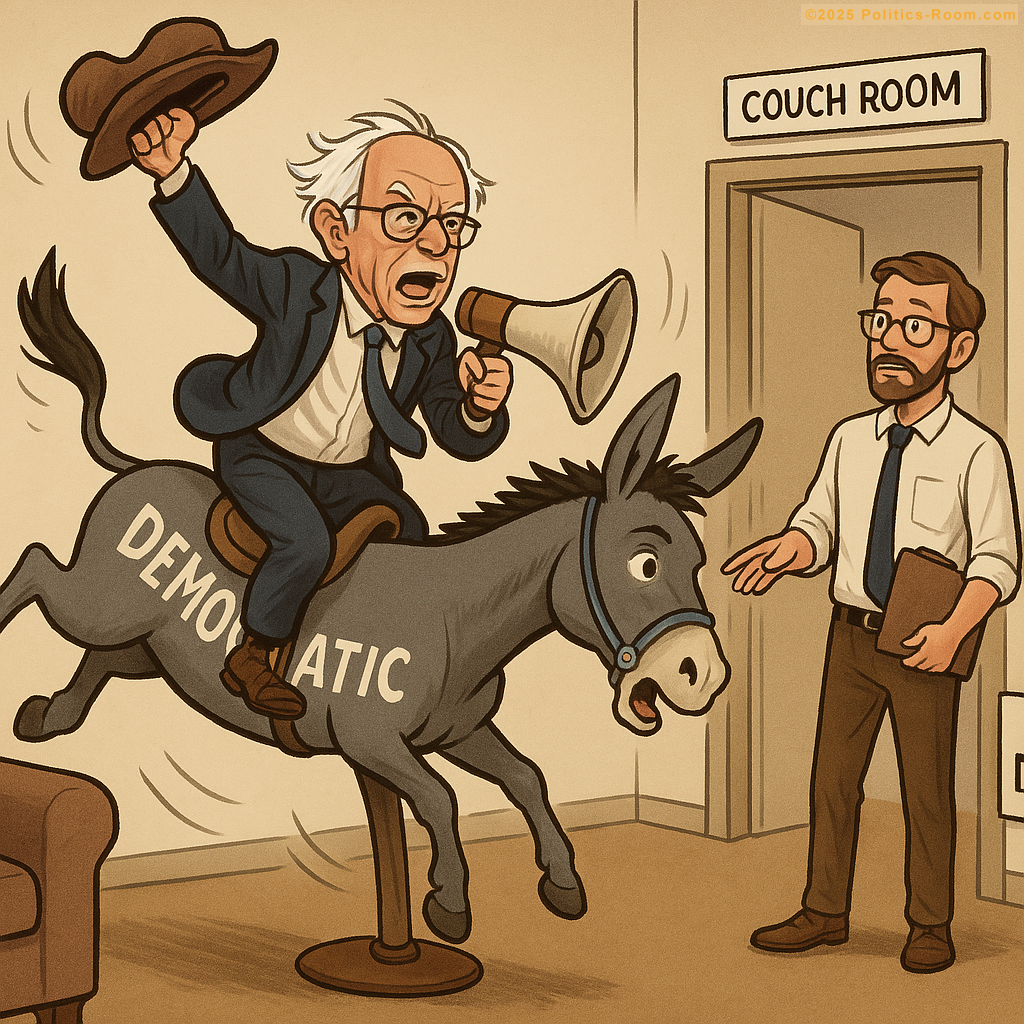
Dr. Bennett walked to his desk and retrieved a small figurine—a ceramic Democratic donkey. He placed it on the table between them.
Dr. Bennett: "Senator, for years you've been riding the Democratic donkey like a rodeo cowboy star. You've used its resources, its ballot access, its debate stages, its donor lists. But you've never fully committed to the party or accepted its collective decision-making."
He picked up the figurine, turning it in his hands.
Dr. Bennett: "The donkey is getting tired. It's been pulled in too many directions. If you genuinely believe in defeating Trumpism and oligarchy, at some point you need to decide: Are you going to be part of building a unified Democratic Party that can win elections, or are you going to continue dividing it between 'establishment' and 'progressive' wings?"
Sanders stared at the donkey figurine, uncharacteristically silent.
Dr. Bennett: "Your fighting oligarchy tour is commendable in many ways. Your policy goals are ambitious and idealistic. But your methods—maintaining permanent campaign infrastructure, directing donors to your organization rather than the party, attacking fellow Democrats as corporate sellouts—these methods undermine the very vessel you're trying to steer."
Sanders finally responded, his voice more reflective than combative.
Bernie Sanders: "The party needs to be transformed. It's not serving working people effectively. It's too beholden to wealthy donors. Someone needs to push it from both inside and outside."
Dr. Bennett: "And you've pushed it effectively. Many of your 2016 policy positions are now mainstream within the party. But at some point, pushing becomes undermining. At some point, transformation needs to become consolidation."
He set the donkey figurine back on the table.
Dr. Bennett: "Senator, I believe the most productive path forward would be for you to continue caucusing with the Democrats, continue advocating for progressive policies, but clearly remove yourself from presidential politics. A simple statement that you will not run in 2028, regardless of party, would change the entire dynamic."
Sanders stood again, moving to the window. The waiting room crowd was still visible through the blinds, some holding homemade signs, others engaged in animated conversation.
Bernie Sanders: "So I can't go on as both an Independent and a Democrat? Who is going to stop me?"
Dr. Bennett looked at him sternly.
Dr. Bennett: "That is a matter of personal responsibility, Senator. You've spent your career advocating for responsibility from corporations and the wealthy. Perhaps it's time to consider your own responsibility to the democratic process and to the movement you've built."
Sanders turned from the window, his expression unreadable.
Bernie Sanders: "I'll think about what you've said. But I make no promises."
Dr. Bennett nodded, recognizing that even this small concession represented progress.
Dr. Bennett: "That's all I can ask, Senator. Thoughtful consideration of the long-term consequences of your actions, not just for your movement, but for the country you so clearly love."
As they moved toward the door, Sanders paused, looking back at the Democratic donkey figurine sitting alone on the table.
Bernie Sanders: "The problem is, Doc, that donkey needs to learn to run faster if we're going to outpace the oligarchs."
Dr. Bennett: "Perhaps. But no animal runs well when its riders are pulling in different directions."
With that final observation hanging in the air, they returned to the waiting room, where the crowd immediately erupted in cheers at the sight of Sanders. The senator acknowledged them with a raised hand, but his usual fiery energy seemed tempered by something new—a hint of thoughtful restraint that hadn't been there before.
The receptionist caught Dr. Bennett's eye with a questioning look. He gave a small nod—not of resolution, but of progress. In therapy, as in politics, change rarely came in dramatic revelations. It came in small moments of reflection, in tiny shifts of perspective that, over time, could alter the course of even the most determined traveler.
Whether Senator Sanders would ultimately choose a different path remained to be seen. But for today, at least, he'd been given something essential to both personal and political health—a mirror that reflected not just his ideals, but the complex consequences of how he pursued them.